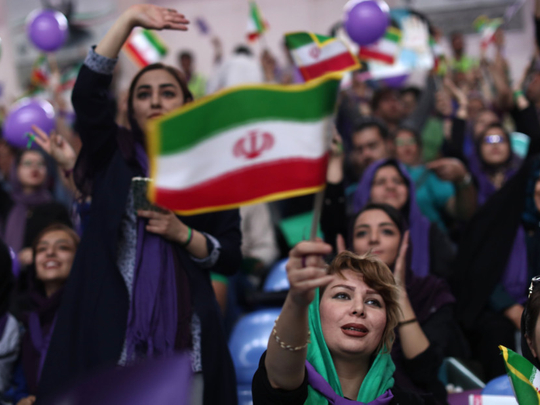
Hassan Rouhani’s resounding victory over his anti-western hardline rival Ebrahim Raisi, the Supreme Leader’s favourite, is a reliable indicator of an evolving public mood. There may have been large glassy-eyed crowds at Raisi’s election rallies giving some observers pause for thought, but waiting in the wings were the quieter ones.
These are men and women who hunger for greater personal freedoms and social reforms but are not so easily mobilised as the fanatics. Many long for the day when their country is accepted into the international community’s fold as a nation that wants peace with its neighbours and respects human rights.
The incumbent was expected to scrape through. However, in light of his failure to demonstrably improve the economy and create jobs, he was not expected to surge ahead garnering 57 per cent. The Trump factor was also touted by pundits as a potential boulder tied to his heels.
Former US president Barack Obama was seen as putty in Tehran’s hands as opposed to his successor. Trump savaged the nuclear deal on the stump calling it “the worst deal ever” although he has since modified his stance and has agreed to the extension of sanctions relief.
To say that Obama and Kerry were pro-Persian/pro-Shiite at the expense of Iran’s Sunni neighbours is an understatement. Trump’s more aggressive posture towards Tehran led numerous analysts to believe that Rouhani’s efforts to reach out to western democracies were a futile exercise. They badly misread the tealeaves. They were wrong.
More emboldened
Flush with success, Rouhani will now be even more emboldened to call for reform than he was during the campaign when he took his rivals to task.
He told Raisi, a clerical judge, not to abuse religion for power, almost daring him to issue an arrest order. He accused another of his competitors, the mayor of Tehran, Mohammad Baqer Qalibaf, of wanting “to beat up students” and even launched an oblique dig at the powerful Revolutionary Guards Corps for its grip on sectors of the economy.
It is beginning to look like the Islamic Revolution’s entrenched old guard is nearing its sell-by date. Set-in-stone revolutionary fervour no longer permeates the minds of young Iranians. Closeted in Qom, the ayatollahs’ pulse on public sentiments is weak.
Ayatollah Ali Khamenei is edging towards his 78th year and suffers from ill health. His eventual passing will rattle Khomeini’s well-laid authoritarian structures and may create a leadership vacuum which Rouhani could be in a position to fulfil provided he is able to capitalise on his popularity.
An unshackled Rouhani could emerge as the man of the people in every respect. The danger is that if seen as becoming too big for his boots, he will become a target of the powers that are the Supreme Council or the Revolutionary Guards.
The IRGC could attempt a takeover to consolidate their own influence or to pre-empt this dinosaur of a regime from collapsing under the kind of revolutionary wave that toppled the monarchy.
In short, if it is the case that the fabric underpinning the regime is in the process of evolutionary decay, Washington should tread a cautious path. On the one hand, Tehran should be warned that there will be consequences to its continued meddling in Arab lands while on the other, the US should avoid alienating Iran’s moderates; they should be nurtured rather than propelled into the ultra-nationalist camp.
Iran’s youth are champing at the bit to see an end to oppressive laws and so are religious and ethnic minorities. As history tells us, people cannot be kept down forever and I firmly believe that Iranians can look forward to freedom’s door opening wide sooner rather than later.
Linda S. Heard is an award-winning British political columnist and guest television commentator with a focus on the Middle East.







